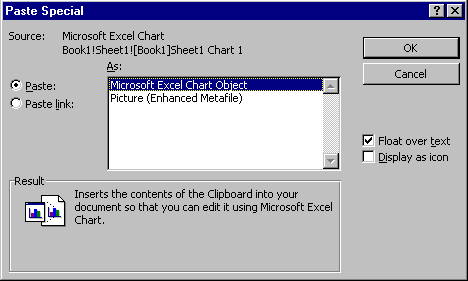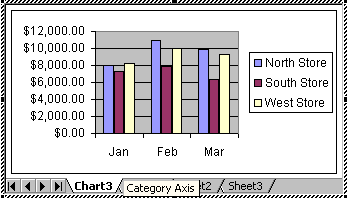You can do any or all of five things with your chart:
Let's look at each of these in turn.
Lesson 7 shows how to insert a chart into a spreadsheet. One of your options is to add the chart to an existing worksheet or create a new worksheet that contains only the chart.
Lesson 7 also shows how to print a chart. You can print a chart alone or as part of a worksheet with data.
Word processing documents can contain charts, just as spreadsheet documents can.
Select the chart you want to copy. Copy the chart, either with the Copy
command in the Edit menu, or by clicking the ![]() icon in the toolbar.
icon in the toolbar.
Now go to your word processing document and set the insertion point at the place that you'd like to embed the chart. Choose Paste Special... from the Edit menu. You'll see this dialog box:

Select, as shown, the options to ![]() a
a ![]() and click
and click ![]() .
.
An embedded chart can be resized and modified in every way that a chart within a spreadsheet can. In fact, when you embed a chart, you are also embedding a small spreadsheet that contains its data. You can view this spreadsheet and work with it by double-clicking on the embedded chart. This will bring up a workbook embedded within your word processing document. The first sheet of the workbook is the chart you copied. The other sheets contain the data that was in the original workbook from which you copied the chart.

Note: You can change the data from here, and the chart redraws itself to match the data that it's associated with. However, you are working with a copy of the data from the original document. Any changes you make here are not reflected in the original spreadsheet document.
Linking a chart into a word processor document is a more sophisticated concept than embedding. When linked, a chart remains associated with the data cells in the spreadsheet document from which it was created. If you later delete the original spreadsheet document, you will not be able to edit the chart in your word processing document. The chart will be abandoned like a lonely satellite floating through space.
To create the link to a chart, follow the same copy-and-paste procedure
as for embedding, but choose the ![]() option instead:
option instead:

The linked chart appears in the word processor document. You can move, resize, and reshape the chart there independently of the chart in the spreadsheet, but all other aspects of the chart will always reflect the data and formatting in the spreadsheet it was drawn from.
Double-clicking on the linked chart causes the chart and its spreadsheet to open in Excel. All editing of the chart is done within the spreadsheet environment.